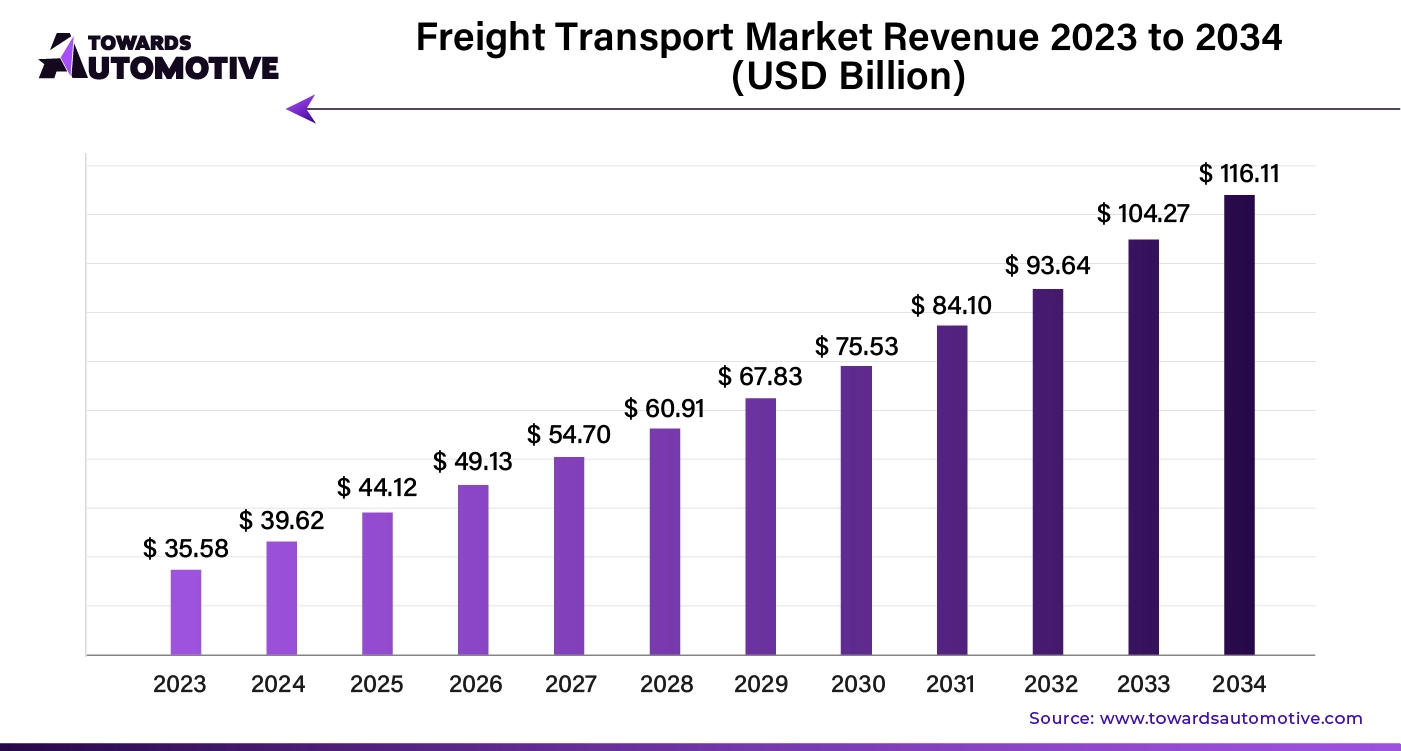The freight transport market plays a vital role in global trade, facilitating the movement of goods across various transportation modes, including road, rail, air, and sea. As industries worldwide continue to expand, the demand for efficient logistics services is growing. The global freight transport market size is valued at USD 39.62 billion in 2024 and is projected to reach USD 116.11 billion by 2034, growing at a compound annual growth rate (CAGR) of 11.35% during the forecast period.

Get All the Details in Our Solution – Download Brochure @ https://www.towardsautomotive.com/download-brochure/1467
This market’s expansion is driven by a combination of factors, including technological advancements, free trade agreements, and an increasing focus on sustainability. However, challenges such as fluctuating fuel prices and infrastructure limitations still pose significant obstacles to growth.
Key Market Insights
- Regional Dominance: North America currently holds the largest share of the freight transport market, thanks to its robust infrastructure and established trade routes. However, Asia Pacific is expected to experience the highest growth rate during the forecast period due to rapid industrialization and the rising demand for logistics services in emerging economies.
- Service Dominance: The service segment leads the market in terms of share, driven by the increasing demand for comprehensive and integrated logistics solutions that offer end-to-end support for supply chains.
- Transportation Mode Preferences: Roadways dominate the freight transport market, providing flexibility and cost-effectiveness. Despite this, rail, air, and sea transportation are integral to specific segments of the industry, depending on the goods being transported.
- Industry Vertical Growth: Retail and e-commerce sectors are key drivers of freight transport demand. As online shopping continues to rise, efficient and scalable logistics solutions are required to meet customer expectations for fast and reliable deliveries.
The Role of Artificial Intelligence in Freight Transport
Artificial Intelligence (AI) is revolutionizing the freight transport market by enhancing operational efficiency, reducing costs, and improving decision-making throughout the logistics chain. AI technologies, such as machine learning, predictive analytics, and automation, are helping optimize route planning, fleet management, and warehouse operations.
By analyzing vast amounts of data, AI can predict disruptions in supply chains—such as weather-related delays, traffic congestion, or equipment malfunctions—and help companies adjust their operations in real-time to minimize delays. Additionally, AI streamlines processes like freight scheduling, inventory management, and cargo tracking, reducing human error and improving accuracy.
One of the most significant innovations in AI-powered freight transport is the development of autonomous vehicles and drones. These technologies are poised to transform last-mile delivery and long-haul transportation by improving fuel efficiency, reducing human error, and increasing safety.
In September 2023, Uber Freight launched an AI-enabled logistics roadmap aimed at enhancing freight transportation capabilities globally. This tool is expected to provide companies with smarter route planning, scheduling, and cargo tracking, driving operational improvements and better customer service.
The Impact of Free Trade Agreements (FTAs)
Free trade agreements (FTAs) play a crucial role in accelerating the growth of the freight transport market. By reducing or eliminating tariffs, streamlining customs procedures, and standardizing regulations, FTAs promote international trade and facilitate the cross-border movement of goods.
For instance, the U.S. has FTAs with several countries, including Australia, Canada, Bahrain, and Chile, among others. These agreements make it easier for businesses to engage in global trade, thereby increasing demand for freight transport services across road, rail, air, and sea modes.
FTAs not only improve market access but also encourage competition among logistics providers, driving investments in infrastructure and technological advancements. As global trade volumes continue to rise, the role of FTAs in facilitating cross-border trade and boosting the freight transport market will remain critical.
Challenges Facing the Freight Transport Market
Despite its promising growth trajectory, the freight transport market faces several challenges that could impede progress. Volatile fuel prices continue to be a significant concern, as rising fuel costs directly impact operational expenses. Additionally, labor shortages—particularly in skilled driving roles—are creating inefficiencies in transportation services.
Furthermore, aging infrastructure in many regions is leading to delays and bottlenecks, affecting overall logistics efficiency. Environmental regulations also present challenges, as companies must invest in sustainable solutions like electric and hybrid vehicles, which can increase costs and slow down market expansion.
Green Logistics: Shaping the Future of Freight Transport
Sustainability has become a major focus within the freight transport market. As environmental concerns grow and stricter emissions regulations are implemented, companies are increasingly turning to green logistics practices to reduce their carbon footprint.
Green logistics includes the adoption of electric and hybrid vehicles, alternative fuels like hydrogen and biofuels, and energy-efficient route optimization strategies. These practices help companies comply with regulatory requirements while also offering a competitive edge by appealing to eco-conscious consumers and investors.
In addition, technological innovations in electric fleets, renewable energy-powered warehouses, and other sustainable solutions are driving the freight transport sector toward greater environmental responsibility. The transition to greener logistics is not only helping companies meet sustainability goals but also delivering cost savings through improved fuel efficiency and optimized operations.
In July 2024, Envision and DHL announced a partnership to further promote green logistics practices within the freight transport landscape. This collaboration underscores the growing trend of integrating sustainability into core logistics operations.
Invest in Our Premium Strategic Solution @ https://www.towardsautomotive.com/price/1467
You can place an order or ask any questions, please feel free to contact us at sales@towardsautomotive.com
Explore the comprehensive statistics and insights on automotive industry data and its associated segmentation: Get a Subscription
For Latest Update Follow Us: https://www.linkedin.com/company/towards-automotive
